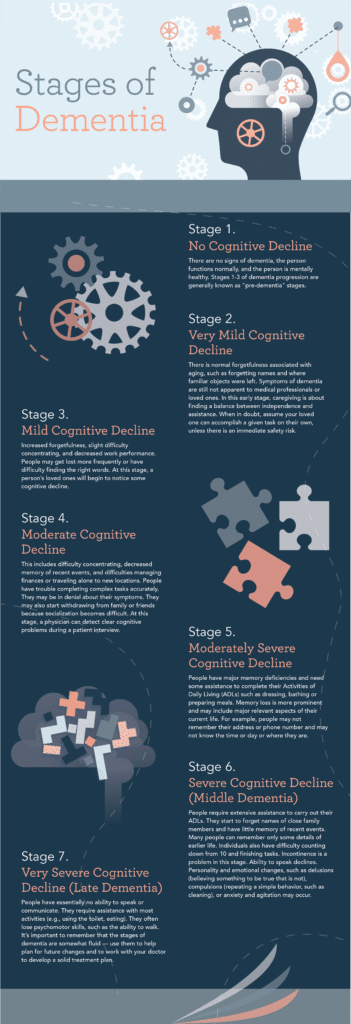While Alzheimer’s disease and other common dementias affect millions of Americans, they are not a normal part of aging. Many older people experience some memory loss, but this doesn’t warrant a diagnosis of dementia. Dementia goes beyond simple forgetfulness.
One of the most difficult things to hear about dementia is that, in most cases, it’s irreversible and incurable. But, with an early diagnosis and proper care, the progression can be managed and slowed down. The cognitive decline doesn’ t happen all at once — the progression can be divided into seven distinct stages of dementia. This is called the Global Deterioration Scale.
Learning about the stages of dementia can help with identifying signs and symptoms early on, as well as assisting those with dementia and their caregivers in knowing what to expect in further stages. The earlier dementia is diagnosed, the sooner treatment can start.

Stage 1: No Cognitive Decline
There are no signs of dementia, the person functions normally, and the person is mentally healthy. Stages 1-3 of dementia progression are generally known as “pre-dementia” stages.
Stage 2: Very Mild Cognitive Decline
In this stage, there is normal forgetfulness associated with aging, such as forgetting names and where familiar objects were left. Symptoms of dementia are still not apparent to medical professionals or loved ones. In this early stage, caregiving is about finding a balance between independence and assistance. When in doubt, assume your loved one can accomplish a given task on his or her own, unless there is an immediate safety risk.
Stage 3: Mild Cognitive Decline
This stage includes increased forgetfulness, slight difficulty concentrating, and decreased work performance. People may get lost more frequently or have difficulty finding the right words. At this stage, a person’s loved ones will begin to notice some cognitive decline.
Stage 4: Moderate Cognitive Decline
This stage includes difficulty concentrating, decreased memory of recent events, and difficulties managing finances or traveling alone to new locations. People have trouble completing complex tasks accurately. They may be in denial about their symptoms. They may also start withdrawing from family or friends because socialization becomes difficult. At this stage, a physician can detect clear cognitive problems during a patient interview.
Stage 5: Moderately Severe Cognitive Decline
People in this stage have major memory deficiencies and need some assistance to complete their Activities of Daily Living (ADLs) such as dressing, bathing or preparing meals. Memory loss is more prominent and may include major relevant aspects of their current life. For example, people may not remember their address or phone number and may not know the time or day or where they are.
Stage 6: Severe Cognitive Decline (Middle Dementia)
People in Stage 6 require extensive assistance to carry out their ADLs. They start to forget names of close family members and have little memory of recent events. Many people can remember only some details of earlier life. Individuals also have difficulty counting down from 10 and finishing tasks. Incontinence is a problem in this stage. Ability to speak declines. Personality and emotional changes, such as delusions (believing something to be true that is not), compulsions (repeating a simple behavior, such as cleaning), or anxiety and agitation may occur.
Stage 7: Very Severe Cognitive Decline (Late Dementia)
People in this stage have essentially no ability to speak or communicate. They require assistance with most activities (e.g., using the toilet, eating). They often lose psychomotor skills. For example, the ability to walk.
It’s important to remember that the stages of dementia are somewhat fluid — use them to help plan for future changes and to work with your doctor to develop a solid treatment plan.
According to the Alzheimer’s Association (2018), there are 16.1 million unpaid caregivers of people with dementia in the United States. While many Americans are caregivers for loved ones, there are many options for care assistance, including Eagle Memory Care communities.
As a loved one progresses through the stages of dementia, their communication needs change. Learn more about the barriers to communication and how to converse with people with dementia.